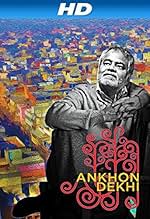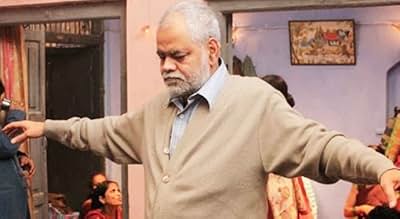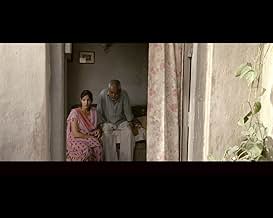Ankhon Dekhi
- 2013
- 1h 47min
CALIFICACIÓN DE IMDb
7.9/10
13 k
TU CALIFICACIÓN
Ankhon Dekhi se centra en el personaje de Raje Bauji, interpretado por Sanjay Mishra que, después de un incidente dramático, decide que solo va a creer en lo que puede ver con sus ojos.Ankhon Dekhi se centra en el personaje de Raje Bauji, interpretado por Sanjay Mishra que, después de un incidente dramático, decide que solo va a creer en lo que puede ver con sus ojos.Ankhon Dekhi se centra en el personaje de Raje Bauji, interpretado por Sanjay Mishra que, después de un incidente dramático, decide que solo va a creer en lo que puede ver con sus ojos.
- Dirección
- Guionista
- Elenco
- Premios
- 9 premios ganados y 11 nominaciones en total
Alka Chatwal
- Sarup Bua
- (as Alka Chawla)
Manu Rishi Chadha
- Sharma Ji
- (as Manu Rishi Chaddha)
Dhruv Uday Singh
- Dhruv
- (as Dhruv Singh)
Danish Husain
- Gopi
- (as Danish Hussain)
Yogendra Tikku
- Pandit
- (as Yogendra Tiku)
- Dirección
- Guionista
- Todo el elenco y el equipo
- Producción, taquilla y más en IMDbPro
Argumento
¿Sabías que…?
- TriviaSanjay Mishra wins filmfare award for best actor critics.
- ConexionesFeatured in 60th Britannia Filmfare Awards (2015)
Opinión destacada
(Probably) Simplicity can never be a passé. A whole generation still connects to the "Ta Na Na Ta Na Na" of Malgudi Days. R.K Narayan Ki duniya talked about the real India, some simple people, their life & its ordeal.
Rajat Kapoor's refreshingly eccentric yet gimmick-less (even hype-less) "Ankho Dekhi" is kind of a dejavu of Malgudi Days. The film revolves around Bauji who lives in his own ideological world & believes in inherent goodness of people. But he isn't gullible person & believes only in "Ankho Dekhi". And in a moment of realization he literary sets on to a journey whereby he decides that he will only believe what he can see for himself. From religion to education to even science - Bauji seeks for his own truth, an experienced one. He will come across as a visionary to someone while others might outright reject him as a nitwit. Kapoor webs an authentic image of a regular middle-class household in the surrounding areas of urban India, the still-prevailing joint family & the ego dynamics. His execution is gentle traversing at its own pace much like the ways of Bauji.
Kapoor's narrative talks about many issues in subtle way & he webs in some brilliant situations to express his points. Like the scene where the priest gives "Prasad" (Godly offering) to Bauji, he takes it, have it & then says that the sweet is good totally unaware of the anger of the priest who kept on insisting that it's not a mere sweet, it is godly offering. Then in another accomplished sequence bauji kept on saying that he won't believe in gods until one of them comes & have tea with him which angers the religious fanatic ones. Going away from religion, he even pokes on the education system whereby he establishes the importance of knowledge beyond books. The debate with the maths teacher on how could one assume that two parallel lines would meet at infinity deserves mention. Then the sequence of visiting a zoo to check whether a tiger roars or meows was superlative.
Kapoor got able support from cinematography, editing & music department bringing out the essence of the narrative deftly. And as the masterstroke climax happened I almost jumped from my seat to applaud & that's when the end credit began with the following note – "Thanking my teachers Mani Kaul & Kumar Shahani" (two of the finest film makers of Indian parallel cinema); what a way to give back to his masters! This is indeed one of the finest films from Rajat Kapoor.
Otherwise typecast & wasted in loud comical characters Sanjay Mishra didn't let slip this opportunity & gave his career best performance as bauji. Hopefully his acting potential will be frequently utilized from now on. The supporting cast were tremendous comprising of Rajat Kapoor himself, Manu Rishi, Pahwa, Miya Sarao (who made a striking debut as the daughter of Bauji), Namit das, even stalwart Saurabh Shukla in a cameo.
Without being preachy the premise makes you (makes us) introspect – all of us, lost in the jungle of consumerism are losing our own thought prowess; the power of self experience. As bauji would have said which goes in English somewhat this - Whatever I am saying is my truth, my experience. Don't go by it only as your's experience & truth can be different.(For some reason IMDb is not allowing me to out the Hindi sentence thus have to give the translated version). In this way the film hits the consumerist (And media dominated) culture whereby people are losing their self identity.
Give this movie a try, you will probably come with a thoughtful grin & might set for your very own 'flight of fancy" (as Masand said).
(Sadly this witty original film got overpowered by ghostly baby dolls & their gang of marketing terrorists..)
Rajat Kapoor's refreshingly eccentric yet gimmick-less (even hype-less) "Ankho Dekhi" is kind of a dejavu of Malgudi Days. The film revolves around Bauji who lives in his own ideological world & believes in inherent goodness of people. But he isn't gullible person & believes only in "Ankho Dekhi". And in a moment of realization he literary sets on to a journey whereby he decides that he will only believe what he can see for himself. From religion to education to even science - Bauji seeks for his own truth, an experienced one. He will come across as a visionary to someone while others might outright reject him as a nitwit. Kapoor webs an authentic image of a regular middle-class household in the surrounding areas of urban India, the still-prevailing joint family & the ego dynamics. His execution is gentle traversing at its own pace much like the ways of Bauji.
Kapoor's narrative talks about many issues in subtle way & he webs in some brilliant situations to express his points. Like the scene where the priest gives "Prasad" (Godly offering) to Bauji, he takes it, have it & then says that the sweet is good totally unaware of the anger of the priest who kept on insisting that it's not a mere sweet, it is godly offering. Then in another accomplished sequence bauji kept on saying that he won't believe in gods until one of them comes & have tea with him which angers the religious fanatic ones. Going away from religion, he even pokes on the education system whereby he establishes the importance of knowledge beyond books. The debate with the maths teacher on how could one assume that two parallel lines would meet at infinity deserves mention. Then the sequence of visiting a zoo to check whether a tiger roars or meows was superlative.
Kapoor got able support from cinematography, editing & music department bringing out the essence of the narrative deftly. And as the masterstroke climax happened I almost jumped from my seat to applaud & that's when the end credit began with the following note – "Thanking my teachers Mani Kaul & Kumar Shahani" (two of the finest film makers of Indian parallel cinema); what a way to give back to his masters! This is indeed one of the finest films from Rajat Kapoor.
Otherwise typecast & wasted in loud comical characters Sanjay Mishra didn't let slip this opportunity & gave his career best performance as bauji. Hopefully his acting potential will be frequently utilized from now on. The supporting cast were tremendous comprising of Rajat Kapoor himself, Manu Rishi, Pahwa, Miya Sarao (who made a striking debut as the daughter of Bauji), Namit das, even stalwart Saurabh Shukla in a cameo.
Without being preachy the premise makes you (makes us) introspect – all of us, lost in the jungle of consumerism are losing our own thought prowess; the power of self experience. As bauji would have said which goes in English somewhat this - Whatever I am saying is my truth, my experience. Don't go by it only as your's experience & truth can be different.(For some reason IMDb is not allowing me to out the Hindi sentence thus have to give the translated version). In this way the film hits the consumerist (And media dominated) culture whereby people are losing their self identity.
Give this movie a try, you will probably come with a thoughtful grin & might set for your very own 'flight of fancy" (as Masand said).
(Sadly this witty original film got overpowered by ghostly baby dolls & their gang of marketing terrorists..)
- rangdetumpy
- 24 mar 2014
- Enlace permanente
Selecciones populares
Inicia sesión para calificar y agrega a la lista de videos para obtener recomendaciones personalizadas
- How long is Ankhon Dekhi?Con tecnología de Alexa
Detalles
- Fecha de lanzamiento
- País de origen
- Sitio oficial
- Idioma
- También se conoce como
- Through My Own Eyes
- Productora
- Ver más créditos de la compañía en IMDbPro
Taquilla
- Total a nivel mundial
- USD 151,226
- Tiempo de ejecución1 hora 47 minutos
- Color
- Mezcla de sonido
- Relación de aspecto
- 2.39 : 1
Contribuir a esta página
Sugiere una edición o agrega el contenido que falta

Principales brechas de datos
By what name was Ankhon Dekhi (2013) officially released in Canada in French?
Responda


















